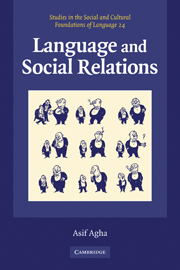Book contents
- Frontmatter
- Contents
- List of figures
- List of tables
- Acknowledgments
- Typographical conventions
- Introduction
- 1 Reflexivity
- 2 From referring to registers
- 3 Register formations
- 4 The social life of cultural value
- 5 Regrouping identity
- 6 Registers of person deixis
- 7 Honorific registers
- 8 Norm and trope in kinship behavior
- Notes
- References
- Index
- STUDIES IN THE SOCIAL AND CULTURAL FOUNDATIONS OF LANGUAGE
Introduction
Published online by Cambridge University Press: 05 September 2012
- Frontmatter
- Contents
- List of figures
- List of tables
- Acknowledgments
- Typographical conventions
- Introduction
- 1 Reflexivity
- 2 From referring to registers
- 3 Register formations
- 4 The social life of cultural value
- 5 Regrouping identity
- 6 Registers of person deixis
- 7 Honorific registers
- 8 Norm and trope in kinship behavior
- Notes
- References
- Index
- STUDIES IN THE SOCIAL AND CULTURAL FOUNDATIONS OF LANGUAGE
Summary
Social relations vary across human societies in ways that are limitlessly varied, endlessly susceptible to reanalysis, periodic stabilization and change. Yet they are highly systematic in each locale for persons who recognize themselves as so related. The goal of this book is to show that such possibilities of variation and change, and their actual determinacy for particular social actors, can only be explained given an adequate conception of the role of language in human affairs. Doing so requires that we move beyond a variety of folk-views of language that exist among its users in particular times and places; for instance, that language is primarily a collection of words; that language is abstract, mental, devoid of materiality; that it stands apart from the ‘things’ that it inertly represents. We will be building towards a rather different conception of language here, a view that focuses on the materiality of language and its relationship to other material things, on classifications of behavior that can be inhabited through behavior, and on processes whereby classifications of behaviors, and of those whose behaviors they are, can be maintained or modified within the order of social interaction in which they are experienced.
It has often been supposed that the variability of social relations observed across societies and history can be tamed by means of various top-down approaches, as in the creation of taxonomies of ‘kinds of society’ viewed as explanations of what people do; or by enumeration of ever more abstract cognitive universals believed to constitute structures of mind independent of human action; or by resort to principles of functional explanation through which actions tend to certain equilibria and yield particular social formations as homeostatic results.
- Type
- Chapter
- Information
- Language and Social Relations , pp. 1 - 13Publisher: Cambridge University PressPrint publication year: 2006

